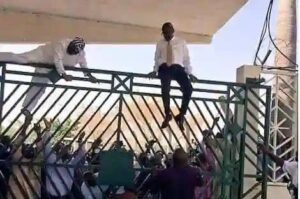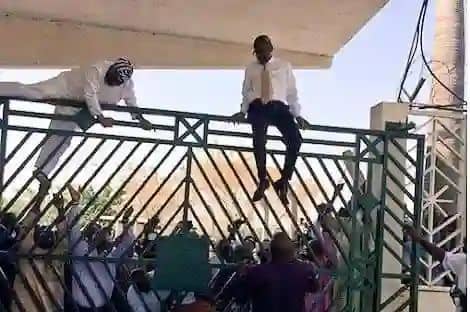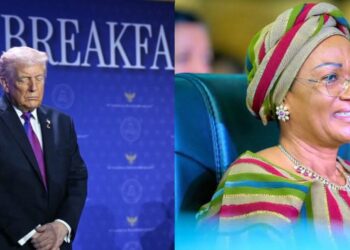In 2014 and 2018, they scaled fences to fight executive power. In 2025, they barely challenge it.

By Ibrahim Kegbegbe
There was a time when members of Nigeria’s National Assembly would scale gates and fences — in designer suits and Italian shoes — to defend what they claimed was the sanctity of democracy.
In November 2014, the country watched in astonishment as lawmakers loyal to then–Speaker Aminu Tambuwal, blocked by police from entering the National Assembly complex after his defection from the ruling Peoples Democratic Party (PDP) to the All Progressives Congress (APC), leapt over iron gates like schoolboys escaping a boarding school punishment. Their target was the Green Chamber, but their goal was to prove loyalty and to resist what they called “executive intimidation” under President Goodluck Jonathan.
Four years later, in April 2018, Nigerians witnessed another unforgettable spectacle. This time, the Red Chamber — the Senate — was in chaos after the mace, the symbol of legislative authority, was snatched by suspected thugs linked to a suspended senator. Locked-out lawmakers, desperate to restore proceedings, clambered over fences and gates to participate in the emergency session. It was a Senate under Bukola Saraki’s leadership, during the tense 8th National Assembly, and under the presidency of Muhammadu Buhari.
These moments, ridiculous yet symbolic, captured a National Assembly that — for all its flaws — still had members willing to cause a public scene for principles they claimed to believe in, whether or not their motives were pure.
The Tinubu Era: From Drama to Docility
Fast forward to 2025 under President Bola Ahmed Tinubu, and the National Assembly feels eerily quiet. No one is jumping fences — not because democracy is flourishing, but because the legislature has grown more comfortable as an extension of the executive arm than as a check on it.
Political analyst Dr. Chika Okonkwo puts it bluntly:
“Today’s lawmakers don’t need to climb fences — the gates have been flung wide open for them. The problem is, they’ve also left the gates of accountability wide open for the executive to walk through unchecked.”
READ ALSO:How Ex-Provost Secured TETFUND, BPP Approval to Fence Private Estate Under False Pretext
In a climate of rising cost of living, fuel subsidy removal pains, and the slow pace of palliative delivery, the chambers have not shown the fiery resistance Nigerians once saw, even if that fire sometimes burnt for selfish reasons. Fence jumping has been replaced with seat-warming.
A History of Legislative Shortcomings
It would be dishonest to romanticize the National Assembly of the past. Under President Olusegun Obasanjo, the legislature often appeared as a trading floor for political loyalty. Allegations of “Ghana Must Go” bribes became household talk, and lawmakers who tried to challenge executive overreach often found themselves victims of sudden impeachments or political exile.
Former lawmaker Hon. Buba Galadima once said:
“Under Obasanjo, you didn’t need to fear the opposition — you feared your own party if you refused to toe the line.”
During the Yar’Adua years, legislative oversight slowed to a crawl, partly because of the president’s ill health and partly due to the ruling party’s firm grip. That era was marked by more silence than substance — the chambers seemed more comfortable in inaction.
Under Goodluck Jonathan, despite moments of independence like Tambuwal’s defection standoff, the legislature was still plagued by budget padding allegations and an inability to hold ministries accountable for corruption.
The Buhari years offered their own theatre — from Saraki’s running battles with the executive to the mace-snatching saga — but the 9th Assembly under Ahmad Lawan became infamous for being a “rubber stamp” parliament, proudly declaring its loyalty to the presidency rather than the people. As one political historian, Dr. Hadiza Musa, observed:
“Lawan didn’t even hide it — he told us he would approve anything the executive brought. At least the fence jumpers gave us suspense.”
Where Do We Go From Here?
The National Assembly, by constitutional design, is supposed to be the people’s parliament — the guardian of checks and balances, the institution that keeps presidents humble. Yet, over the last two decades, whether under Obasanjo’s political muscle, Yar’Adua’s quiet rule, Jonathan’s balancing act, Buhari’s divided chambers, or Tinubu’s current dominance, the legislature has failed to consistently protect Nigerians from poor governance.
The fence-jumping of 2014 and 2018 may have been messy, even comical, but it at least showed a spark of defiance. Today, with a subdued Assembly that rarely questions the presidency, one wonders if silence has become more dangerous than chaos.
Former Senate staffer Yakubu Danladi sums it up with an uneasy truth:
“It’s better to have lawmakers who make a ruckus than lawmakers who make excuses.”
Nigeria doesn’t need lawmakers who can leap fences. It needs lawmakers who can leap into action, not for their political godfathers or personal ambitions, but for the millions of citizens who expect more than theatrics and empty promises.
READ ALSO:Lagos APC Slams Aregbesola for ‘Betrayal’, Says ADC’s ‘New Deal’ is Empty Rhetoric
Until then, the gates of the National Assembly may stay open — but the gates of accountability remain firmly shut.
Ibrahim Kegbegbe is a journalist and public affairs analyst. He writes from Lagos.

















